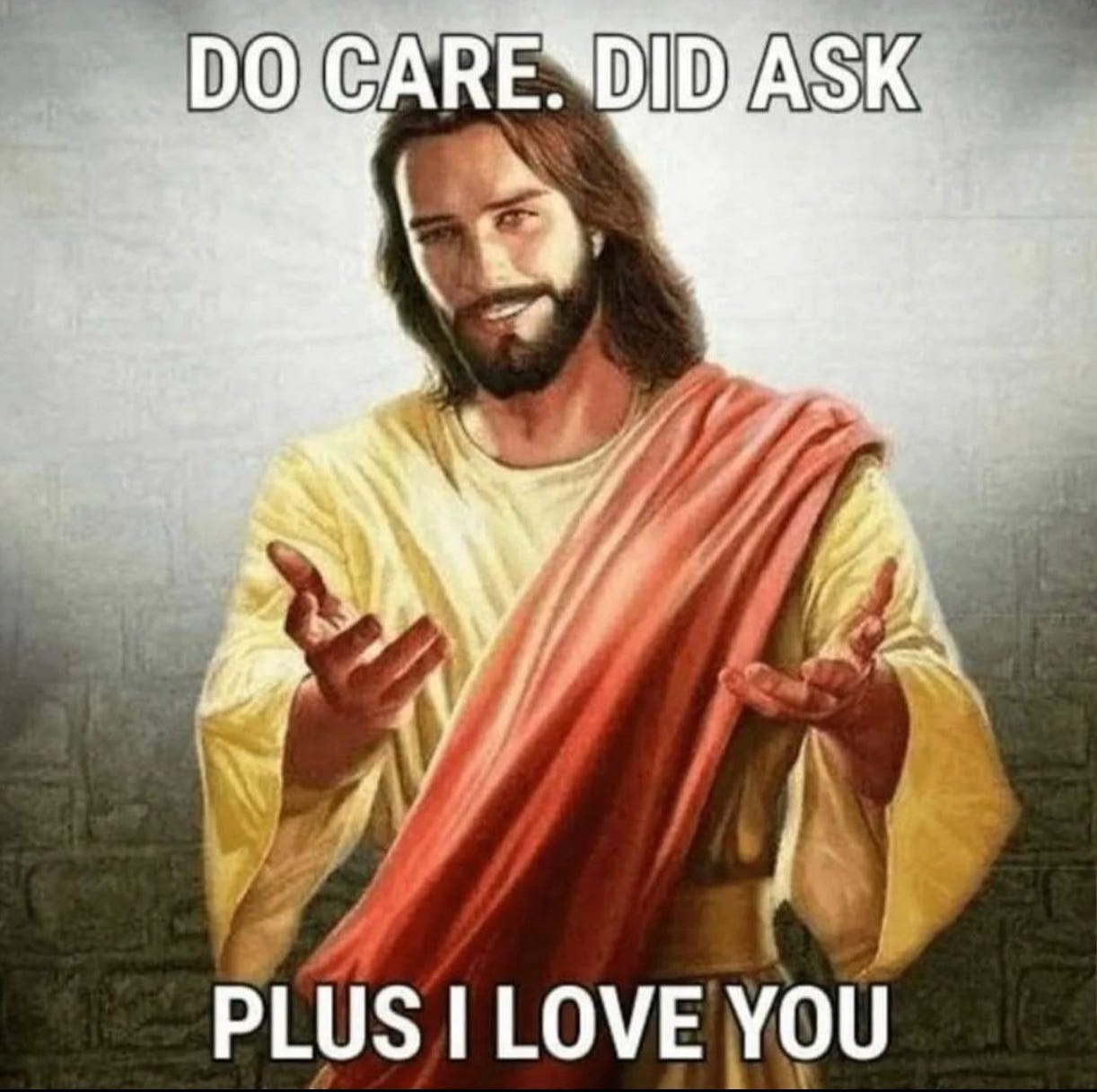Jesus year
turning 33 and other paraphernalia
There is an instagram account called @ineedgodineverymomentofmylife that I simply adore. They publish memes about godly things, like this.
Although their website proudly states that this is not a joke and they are in fact “God-lovers” who need God in every moment of their lives, it can be hard to gauge their sincerity. They do love God, obviously, but all the jokes and engagement with digital culture leave room for doubt - do they actually believe? Room for doubt makes them relatable (read:human) and probably paved the way for their 100k followers.
Irony, for my generation, has long been a safety valve. To do/love/believe something ironically is to not do/love/believe it all the way. The classic example is the “ironic sweater,” one of the first items of hipster-wear popular around 2006-2012 ish. It often featured garish print, knit with an unsightly combination of colors, or had been purchased somewhere uncool and uncouth, like the gas station or the hunting goods store, and depicted giant glittering wolf heads against a night sky. When you wear a sweatshirt ironically, you build a space between who you are and what you do, so that you can flee to high ground in case of attack. Of course I don’t actually like this sweater. I’m wearing it ironically. At the time, how you actually felt about anything wasn’t easily put in words, and perhaps interested nobody.
I know that fad from ten years ago, when I was 23. I just turned 33, and I don’t know if the fad faded as much as it radically transformed. Now, it seems like the irony has moved from one place (I don’t actually feel anything) to a completely different one (I am so devoted it is almost a joke).
For my birthday, my friends from COVEN BERLIN gave me a bikini that says, on one boob, “Father,” on the other, “Son,” and… so forth. I was thrilled to receive the present for several reasons:
it’s hot
it adds to my collection of Christian paraphernalia, which includes a one-piece rainbow (pride edition) swimsuit that says “i need god in every moment of my life,” a gas station hat that says “JESUS: DIED TO SAVE U,” and a gorgeous river pearl crucifix necklace
wearing it is a great conversation starter for conversations that go something like this:
“OMG does that swimsuit say I need God in every moment of my life?”
“Yeah it definitely does.”
“OMG hilarious”
“Yeah it’s so funny and also very true”
“What?”
“Yeah I’m actually a practicing Episcopalian, which for me means that like…”
The above feels controversial to divulge. One of the many, many violent things about Christian history is our missionary culture, and this sample conversation is not separated from that. I want to share my feelings about God; it’s part of the schtick. I’m definitely not actively trying to actually convert anyone, but there is a part of “spreading the good word” that is undeniably built in to my faith, whether I like it or not, which feels important to acknowledge. Being religious is weird! It’s not the secularism that makes many normative white Europeans feel safe - ask those here in Europe who are frustrated with how the mainstream media is portraying the ongoing Iranian revolution. Religion is complicated and messy and very hard to talk about. When it works for you, and you have the impulse and audience, I think it’s great to share your feelings about it. It’s not private, no matter what the French government says. We need more information so that religion is able to get more complex.
(Sometimes I want to hide my feelings about God. Sometimes I feel like I’m not practicing enough to make such a big deal about it. Sometimes I feel like given how much I talk about it, it might be good to get down on my fucking knees from time to time and have a good pray.)
Where am I going with all this? I think because 33 is the “Jesus Year” I just wanted to note how these days, Christian things are around in popular digital culture, to varying degrees of sincerity, with varying degrees of critical thought, and to varying gains of profit in social capital. The author and theologian Senthuran Varatharajah wrote a piece in Arts of the Working Class that is unflinching in its sincerity and seems to come out of thorough theological research. The essay, entitled "Taking Care of God” is choreographic; it’s a “finger pointed at the sky” in attempt to liberate God through destruction. Radical principles, probably considered blasphemous by even moderate Christian scholars, are put forward by the author: God is Becoming, Fallible, Weak, and needs us to take Care of Godself. It’s a complex text so I don’t want to get in too deep here. Suffice to share my take, which is that Varatharajah’s love and belief in God give him the gumption to claim that these principles are how we can prepare for “God’s arrival, and Their way back home.”
What shocks me most is that Arts of a Working Class agreed to publish a sketch for the return of the messiah. AWC’s business model is basically marxist. On their ‘about’ page, they describe AWC as “A multi-lingual street journal on poverty and wealth, art and society” and go on to explain how “its terms are based upon the working class, meaning everyone, and it reports everything that belongs to everyone. Everyone who sells this street journal earns money directly. Vendors keep 100% of the sales. Every artist whose work is advertised, designs with us its substance.”
Why am I so shocked? I shouldn’t be. If AWC '“reports everything that belongs to everyone,” then I don’t know why I am shocked that Chrisitan stuff would be included. Also, Jesus was pretty much a marxist (not that I am a marxist scholar or a theologian but CORRECT ME IF I’M WRONG). Maybe I feel guilty and also glad that this part of my identity is getting a more nuanced address.
Artist, avid meme appreciator, friend of mine, and aficionado of the resurgence of Jewish traditionalism in contemporary queer culture, Cleo Kempe Towers (aka @emotionallaborqueen) recently went to see Lil Nas Ex in concert and wrote on their story how thrilled they were to watch a pop star…
* I mercilessly just killed a fly *
… process their church trauma through art. Cleo was actually the first one to congratulate me on my Jesus year. We also happen to be the same age. The Jesus year was supposed to be the topic of this newsletter, but I still don’t know what it means. Some tourism on Reddit said it was a moment when being an adult starts to feel strong, energizing, confident. You know what you want and you are getting your ducks in a row. It’s working out. You are hopeful. Your message is powerful and people recognize you for what you are saying. When I pressed Cleo further about it, they said that since Jesus was 33 when he died, it’s the bridge year between “human Jesus and heavenly Jesus.” They go on, “we are in the midst of a particular transformation - the shadow of Saturn has passed, we have all these new tools in our emotional/practical tool box, and are grown-ass adults ready for: ?”
Perhaps. I am certainly excited to be 33, and the difference between this age and 28 feels more stark than the difference between 28 and 23, although my 28-year-old self might beg to differ. The 28 year old didn’t know how to communicate about her relationship to Christianity in a way that felt relevant to other people. Now she does, or tries to with the help of words and memes, sincerity and irony, guilt and gladness.
If you want to help me spread the good word and also give me a birthday present, know that I really do want you to share this newsletter with your friends, colleagues, family, strangers you meet at a bar, dance class, or during worship. Honestly it would mean a lot to me if you shared it. You can do so by clicking this button:
Thank you to Cleo Kempe Towers for lovingly guest-editing this edition of 5, 6, 7, 8! Cleo has a podcast and popular meme account.
All the memes in this edition were created or shared by @ineedgodineverymomentofmylife. They sell amazing merch, have a godcast, and really have their finger on the pulse of that sacred heartbeat. Je recommend.
—
Lil’ Announcements
On December 9th at Falscher Fisch, Ziegrastr. 1, there is the screening of LANDERS, a short film that blurs the boundaries between art making and community work. It is by and with B A G & Stadtwerk mrzn community. Workshop at 17h (register here), 18:15 for food and drinks, screening at 19h, dancing from 20-23 with DJ Prince Emrah. Here’s a trailer.
On December 15th, Layton Lachman, Camila Malenchini and I will be hosting a casual PowerPoint Presentation Party at Fortuna, at 8pm. The lineup is still getting figured out but it’s going to be HOT. There is no entrance fee, just bring something for the Free Bar, such as kombucha, salt & vinegar chips, tequila, chocolate, loquats, dried fruit, sparkling water, cornbread…
On December 17th and 18th, Melanie Jame Wolf will open her new solo exhibition, The Creep, at feldfünf with two performances. It's about a mountain and a cowboy. Sculpture as choreography. Snakes and tongues. Metaphor as violence.






